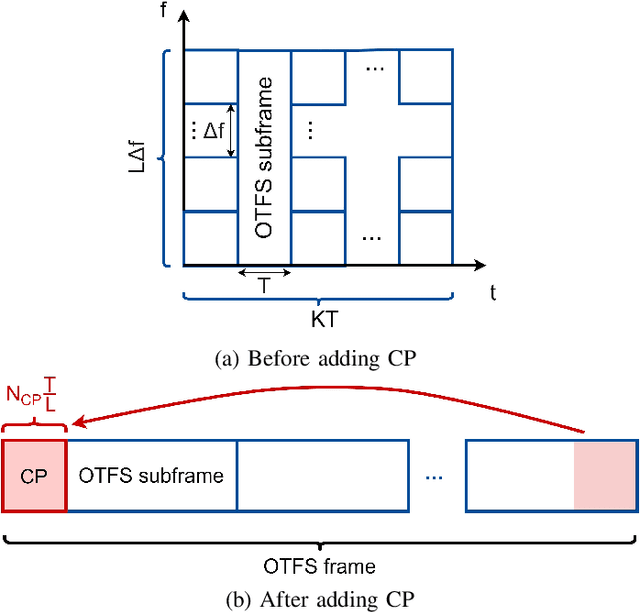Xinwei Qu
Untrained Neural Network based Bayesian Detector for OTFS Modulation Systems
May 08, 2023Abstract:The orthogonal time frequency space (OTFS) symbol detector design for high mobility communication scenarios has received numerous attention lately. Current state-of-the-art OTFS detectors mainly can be divided into two categories; iterative and training-based deep neural network (DNN) detectors. Many practical iterative detectors rely on minimum-mean-square-error (MMSE) denoiser to get the initial symbol estimates. However, their computational complexity increases exponentially with the number of detected symbols. Training-based DNN detectors typically suffer from dependency on the availability of large computation resources and the fidelity of synthetic datasets for the training phase, which are both costly. In this paper, we propose an untrained DNN based on the deep image prior (DIP) and decoder architecture, referred to as D-DIP that replaces the MMSE denoiser in the iterative detector. DIP is a type of DNN that requires no training, which makes it beneficial in OTFS detector design. Then we propose to combine the D-DIP denoiser with the Bayesian parallel interference cancellation (BPIC) detector to perform iterative symbol detection, referred to as D-DIP-BPIC. Our simulation results show that the symbol error rate (SER) performance of the proposed D-DIP-BPIC detector outperforms practical state-of-the-art detectors by 0.5 dB and retains low computational complexity.
Bayesian Neural Network Detector for an Orthogonal Time Frequency Space Modulation
Jun 27, 2022



Abstract:The orthogonal time-frequency space (OTFS) modulation is proposed for beyond 5G wireless systems to deal with high mobility communications. The existing low complexity OTFS detectors exhibit poor performance in rich scattering environments where there are a large number of moving reflectors that reflect the transmitted signal towards the receiver. In this paper, we propose an OTFS detector, referred to as the BPICNet OTFS detector that integrates NN, Bayesian inference, and parallel interference cancellation concepts. Simulation results show that the proposed OTFS detector significantly outperforms the state-of-the-art.
Bayesian-based Symbol Detector for Orthogonal Time Frequency Space Modulation Systems
Oct 27, 2021



Abstract:Recently, the orthogonal time frequency space (OTFS) modulation is proposed for 6G wireless system to deal with high Doppler spread. The high Doppler spread happens when the transmitted signal is reflected towards the receiver by fast moving objects (e.g. high speed cars), which causes inter-carrier interference (ICI). Recent state-of-the-art OTFS detectors fail to achieve an acceptable bit-error-rate (BER) performance as the number of mobile reflectors increases which in turn, results in high inter-carrier-interference (ICI). In this paper, we propose a novel detector for OTFS systems, referred to as the Bayesian based parallel interference and decision statistics combining (B-PIC-DSC) OTFS detector that can achieve a high BER performance, under high ICI environments. The B-PIC-DSC OTFS detector employs the PIC and DSC schemes to iteratively cancel the interference, and the Bayesian concept to take the probability measure into the consideration when refining the transmitted symbols. Our simulation results show that in contrast to the state-of-the-art OTFS detectors, the proposed detector is able to achieve a BER of less than $10^{-5}$, when SNR is over $14$ dB, under high ICI environments.
 Add to Chrome
Add to Chrome Add to Firefox
Add to Firefox Add to Edge
Add to Edge